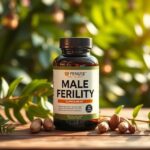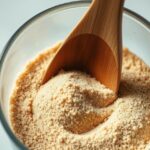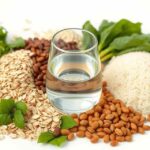How to Increase Egg Quality: Proven Methods to Increase Fertility
Female eggs are the largest cells in the human body, and women are born with all the eggs they’ll ever have. By puberty, only around 300,000 to 500,000 eggs remain, and women only ovulate about 300 to 500 eggs over their reproductive lifetime.

Egg quality is a critical factor in female fertility, significantly impacting the chances of successful conception and pregnancy. As women age, the quality of eggs declines due to accumulated DNA damage and a higher likelihood of chromosomal abnormalities during cell division.
Understanding what affects egg quality and how to improve it can be life-changing for women struggling with fertility issues. This comprehensive guide explores proven methods to enhance egg health through lifestyle modifications, dietary changes, and supplementation.
Key Takeaways
- Egg quality significantly impacts female fertility and conception chances.
- Aging women experience declining egg quality due to DNA damage.
- Lifestyle modifications and dietary changes can improve egg health.
- Supplementation can support and potentially enhance egg quality.
- Understanding egg quality is crucial for women struggling with fertility.
- 7 Best Foods to Increase Fertility (Backed by Science)
- Intimate Wellness Products: A Complete Guide to Health & Pleasure
Understanding Egg Quality and Its Impact on Fertility
Understanding egg quality is crucial for women who are trying to conceive. Egg quality refers to the genetic and cellular health of eggs, which is vital for successful fertilization and pregnancy.
What Is Egg Quality?
Egg quality is a measure of the health and viability of eggs. It is influenced by various factors, including age, genetics, and lifestyle. Women are born with a finite number of eggs, and their quality declines with age.
The Relationship Between Egg Quality and Fertility
Egg quality has a direct impact on fertility. Poor egg quality can lead to difficulties in conceiving, increased risk of miscarriage, and failed IVF cycles. On the other hand, good egg quality enhances the chances of successful fertilization and a healthy pregnancy.
| Characteristics | Egg Quality | Egg Quantity (Ovarian Reserve) |
|---|---|---|
| Definition | Genetic and cellular health of eggs | Number of eggs available in the ovaries |
| Influencing Factors | Age, genetics, lifestyle | Age, medical conditions |
| Impact on Fertility | Directly affects fertilization and pregnancy | Influences the chances of conception |
The Difference Between Egg Quality and Quantity
Egg quantity, or ovarian reserve, refers to the number of eggs remaining in the ovaries. While related, egg quality and quantity are distinct aspects of female fertility. It’s possible to have a good quantity of eggs but poor quality, or vice versa.
Understanding the distinction between egg quality and quantity helps women make informed decisions about their fertility options.
Factors That Affect Egg Quality
Egg quality is influenced by a multitude of factors, including age, genetics, and environmental exposures. Understanding these factors is crucial for women who are trying to conceive, as they can significantly impact fertility.
Age and Its Effect on Eggs
Age is a significant factor affecting egg quality. As women age, the quality and quantity of their eggs decline. This decline accelerates after the age of 35, making it more challenging to conceive.
Genetics and Family History
Genetics and family history also play a role in determining egg quality. Women with a family history of early menopause or certain genetic conditions may experience poorer egg quality.
Health Conditions That Impact Egg Quality
Certain health conditions can significantly impact egg quality. For instance, extreme weight loss or over-exercising can disrupt hormone levels and ovulation.
PCOS and Egg Quality
Polycystic Ovary Syndrome (PCOS) is a hormonal disorder that can affect ovulation and egg quality. Women with PCOS may experience irregular ovulation, making it harder to conceive.
Endometriosis and Other Conditions
Endometriosis, a condition where tissue similar to the lining inside the uterus grows outside of it, can also impact egg quality. Other conditions, such as thyroid disorders, can further complicate fertility.
Environmental Factors
Environmental factors can significantly impact egg quality through various mechanisms, including oxidative stress and hormonal disruption. Exposure to toxins like pesticides, BPA, and heavy metals can damage eggs. Workplace hazards, air pollution, and cigarette smoke also contain compounds that can accelerate egg aging. Reducing exposure to these factors through lifestyle modifications can help protect and potentially improve egg quality.

By understanding the factors that affect egg quality, women can take proactive steps to mitigate risks and improve their chances of conceiving. This includes maintaining a healthy lifestyle, avoiding harmful environmental exposures, and managing health conditions.
How to Evaluate Your Egg Quality
Assessing egg quality can be a complex process, but it’s essential for women trying to conceive. Evaluating egg quality helps women understand their fertility potential and make informed decisions about their reproductive health.
Medical Tests to Assess Egg Health
Several medical tests can help assess egg quality. These tests provide valuable information about a woman’s reproductive health and fertility potential.
AMH (Anti-Müllerian Hormone) Testing
AMH testing measures the level of anti-Müllerian hormone in the blood, indicating the number of eggs remaining in the ovaries.
FSH (Follicle-Stimulating Hormone) Testing
FSH testing measures the level of follicle-stimulating hormone in the blood, which helps evaluate ovarian function.
Antral Follicle Count
An antral follicle count is an ultrasound test that measures the number of antral follicles in the ovaries, indicating egg reserve.
Signs of Poor Egg Quality
Women with poor egg quality may experience irregular cycles, difficulty conceiving, or recurrent miscarriages. These signs indicate potential issues with egg quality.
When to Consult a Fertility Specialist
If you’re over 35 and have been trying to conceive for over a year, or if you’re between 35-40 and have been trying for six months, it’s time to consult a fertility specialist. Women over 40 should seek evaluation after three months.

How to Increase Egg Quality Through Lifestyle Changes
Lifestyle changes play a crucial role in enhancing egg quality and overall reproductive health. By making informed decisions about daily habits and routines, women can significantly improve their fertility.
Nutrition for Optimal Egg Health
A well-balanced diet is essential for maintaining healthy eggs. Consuming the right foods can provide the necessary nutrients for optimal egg development.
Foods That Boost Egg Quality
Foods rich in antioxidants, such as leafy greens and berries, help protect eggs from damage. Omega-3 fatty acids found in salmon and walnuts support overall reproductive health. A diet rich in whole grains, lean proteins, and healthy fats is also beneficial.
Foods to Avoid
Certain foods can negatively impact egg quality. High-mercury fish, processed meats, and excessive caffeine can be detrimental. Limiting or avoiding these foods can help improve fertility.

Exercise and Physical Activity
Regular exercise is vital for maintaining a healthy weight and reducing stress, both of which are beneficial for egg quality. Moderate physical activity, such as walking or yoga, can be particularly effective.
Stress Management Techniques
High stress levels can negatively impact fertility. Practicing stress-reducing techniques like meditation, deep breathing, or mindfulness can help mitigate this effect and improve overall well-being.
Eliminating Harmful Habits
Certain habits can significantly impair egg quality. Quitting smoking and reducing alcohol consumption are crucial steps in improving fertility.
Quitting Smoking
Smoking is known to damage eggs and reduce fertility. Quitting smoking can greatly improve egg health and overall reproductive well-being.
Reducing Alcohol Consumption
When it comes to alcohol, there’s evidence it may negatively impact egg quality. Try to minimize your intake as much as possible when you’re trying to conceive. Alcohol consumption can disrupt hormone production and metabolism, affecting the delicate balance needed for optimal egg development. Even moderate drinking has been associated with decreased fertility. Reducing or eliminating alcohol at least three months before attempting conception allows time for new eggs to develop in an alcohol-free environment.
Supplements and Nutrients That Improve Egg Quality
To improve fertility, it’s essential to understand the role of supplements in enhancing egg quality. Various nutrients and supplements have been identified as beneficial for women looking to conceive.
Essential Vitamins and Minerals
Certain vitamins and minerals play a crucial role in improving egg quality. These nutrients support overall reproductive health and are vital for optimal fertility.
Vitamin D
Vitamin D is known to influence the quality of eggs and is often recommended for women undergoing fertility treatments.
Folic Acid
Folic acid is crucial for preventing birth defects and supporting the early stages of pregnancy.
Omega-3 Fatty Acids
Omega-3 fatty acids support overall health and have been linked to improved egg quality.
Antioxidants for Egg Health
Antioxidants help protect eggs from oxidative stress, thereby improving their quality.
Coenzyme Q10 (CoQ10)
CoQ10 is an antioxidant that has been shown to improve egg quality by reducing oxidative stress.
Vitamin C and E
Vitamins C and E are antioxidants that play a significant role in protecting eggs from damage.
Other Beneficial Supplements
In addition to vitamins and minerals, other supplements have been found to support egg health.
DHEA
DHEA is a hormone that has been linked to improved egg quality and fertility.
Myo-inositol
Myo-inositol is particularly beneficial for women with PCOS, helping to improve insulin sensitivity and restore normal ovulatory function. Research indicates that myo-inositol may improve egg quality by supporting cellular metabolism and reducing oxidative stress.
The following table summarizes key supplements and their benefits for egg quality:
| Supplement | Benefit | Recommended Dosage |
|---|---|---|
| Myo-inositol | Improves insulin sensitivity and egg quality | 2-4 grams daily |
| CoQ10 | Reduces oxidative stress | 100-200 mg daily |
| Omega-3 Fatty Acids | Supports overall health and egg quality | 1000 mg daily |

By incorporating these supplements and nutrients into their diet, women can potentially improve their egg quality and overall fertility.
In Conclusion: Creating Your Personal Egg Quality
A comprehensive strategy is essential for improving egg quality and increasing the chances of conception. This involves a combination of dietary changes, targeted supplementation, stress management, and lifestyle modifications tailored to your age, health status, and fertility goals.
Working closely with healthcare providers is crucial to identify specific fertility challenges and develop an effective approach. Most interventions require at least 3-4 months to show results, as this is the time it takes for eggs to mature.
Tracking progress through regular medical evaluations helps determine if the plan is working or needs adjustment. Consistency is key, and maintaining realistic expectations based on individual circumstances is vital. By improving egg quality naturally, women can enhance their chances of success with assisted reproductive technologies if needed.
FAQ on How to Increase Egg Quality
Q1. What are the most significant factors that affect egg quality?
Ans: Age, genetics, health conditions, and environmental factors can all impact egg quality. For instance, women over 35 years old may experience a decline in egg quality due to the natural aging process.
Q2. Can lifestyle changes really improve egg quality?
Ans: Yes, adopting a healthy lifestyle can positively impact egg quality. This includes consuming a balanced diet rich in essential nutrients, engaging in regular exercise, managing stress, and avoiding harmful habits like smoking.
Q3. How can I assess my egg quality?
Ans: Medical tests, such as basal follicle-stimulating hormone (FSH) testing and antral follicle count (AFC) ultrasound, can help evaluate egg health. Additionally, signs like irregular menstrual cycles or difficulty conceiving may indicate poor egg quality.
Q4. Does ovarian reserve impact egg quality?
Ans: Ovarian reserve refers to the number of eggs remaining in the ovaries. While a low ovarian reserve can be associated with poor egg quality, they are not the same thing. Women with a low ovarian reserve may still have good egg quality, and vice versa.
Q5. Can certain health conditions affect egg quality?
Ans: Yes, certain health conditions, such as polycystic ovary syndrome (PCOS), endometriosis, and thyroid disorders, can impact egg quality. Managing these conditions through medical treatment and lifestyle changes can help improve egg health.












